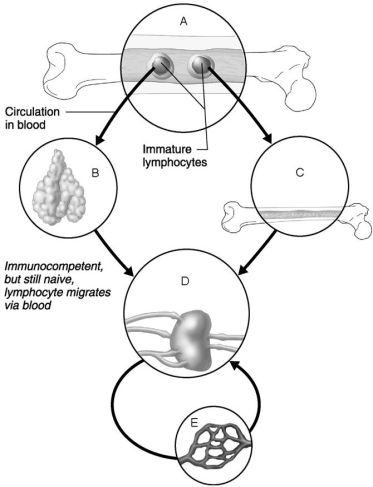Exam 21: The Immune System: Innate and Adaptive Body Defenses
Exam 1: The Human Body: an Orientation118 Questions
Exam 2: Chemistry Comes Alive137 Questions
Exam 3: Cells: the Living Units131 Questions
Exam 4: Tissue: the Living Fabric109 Questions
Exam 5: The Integumentary System112 Questions
Exam 6: Bones and Skeletal Tissue106 Questions
Exam 7: The Skeleton125 Questions
Exam 8: Joints103 Questions
Exam 9: Muscles and Muscle Tissue129 Questions
Exam 10: The Muscular System100 Questions
Exam 11: Fundamentals of the Nervous System and Nervous Tissue95 Questions
Exam 12: The Central Nervous System138 Questions
Exam 13: The Peripheral Nervous System and Reflex Activity103 Questions
Exam 14: The Autonomic Nervous System103 Questions
Exam 15: The Special Senses147 Questions
Exam 16: The Endocrine System129 Questions
Exam 17: Blood126 Questions
Exam 18: The Cardiovascular System: the Heart107 Questions
Exam 19: The Cardiovascular System: Blood Vessels133 Questions
Exam 20: The Lymphatic System and Lymphoid Organs and Tissues88 Questions
Exam 21: The Immune System: Innate and Adaptive Body Defenses124 Questions
Exam 22: The Respiratory System123 Questions
Exam 23: The Digestive System148 Questions
Exam 24: Nutrition,metabolism,and Body Temperature Regulation123 Questions
Exam 25: The Urinary System129 Questions
Exam 26: Fluid,electrolyte,and Acid-Base Balance110 Questions
Exam 27: The Reproductive System131 Questions
Exam 28: Pregnancy and Human Development99 Questions
Exam 29: Heredity120 Questions
Select questions type
Pure antibody preparations specific for a single antigenic determinant are called ________ antibodies.
(Short Answer)
4.8/5  (48)
(48)
Which of the following statements is a false or incorrect statement?
(Multiple Choice)
4.9/5  (36)
(36)
An autoimmune disease that severely impairs renal function is ________.
(Short Answer)
4.8/5  (38)
(38)
Which of the following is not a role of activated complement?
(Multiple Choice)
4.7/5  (38)
(38)
A group of at least 20 plasma proteins that normally circulate in an inactive state and are a major mechanism for destroying foreign substances in the body are referred to as ________.
(Short Answer)
4.9/5  (29)
(29)
Monoclonal antibodies are used in clinical laboratory diagnosis because they bind to many antigenic determinates.
(True/False)
4.9/5  (29)
(29)
Which of the following best describes the qualities of most antigens?
(Multiple Choice)
4.8/5  (32)
(32)
 Figure 21.2
Using Figure 21.2, match the following:
-Area seeded by immunocompetent B and T cells.
Figure 21.2
Using Figure 21.2, match the following:
-Area seeded by immunocompetent B and T cells.
(Multiple Choice)
4.7/5  (31)
(31)
Match the following:
-Kills cancer cells and virus infected body cells.
(Multiple Choice)
5.0/5  (32)
(32)
In clonal selection of B cells,which substance is responsible for determining which cells will eventually become cloned?
(Multiple Choice)
4.7/5  (35)
(35)
Septic shock is a dangerous condition where the ________ are released unchecked,making the capillaries very leaky and thus depleting blood fluids.
(Short Answer)
4.7/5  (42)
(42)
 Figure 21.2
Using Figure 21.2, match the following:
-Area where T cells become immunocompetent.
Figure 21.2
Using Figure 21.2, match the following:
-Area where T cells become immunocompetent.
(Multiple Choice)
4.9/5  (42)
(42)
Which of the following cells has the largest role and most widespread effect on immunity?
(Multiple Choice)
4.9/5  (38)
(38)
Match the following:
-Along with IgM,this is a B cell receptor.
(Multiple Choice)
4.9/5  (33)
(33)
Showing 101 - 120 of 124
Filters
- Essay(0)
- Multiple Choice(0)
- Short Answer(0)
- True False(0)
- Matching(0)